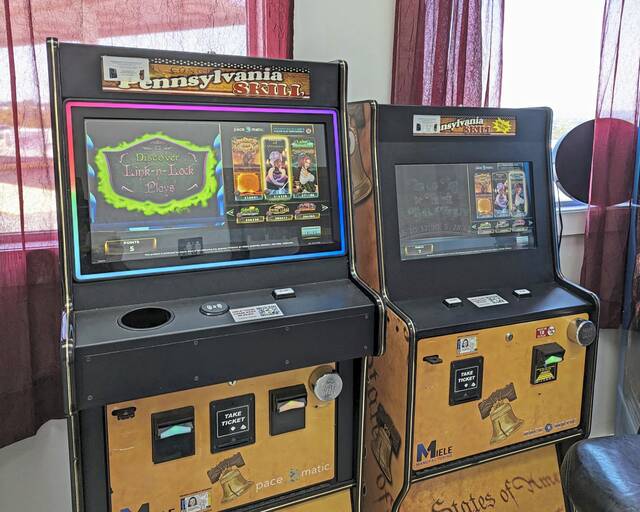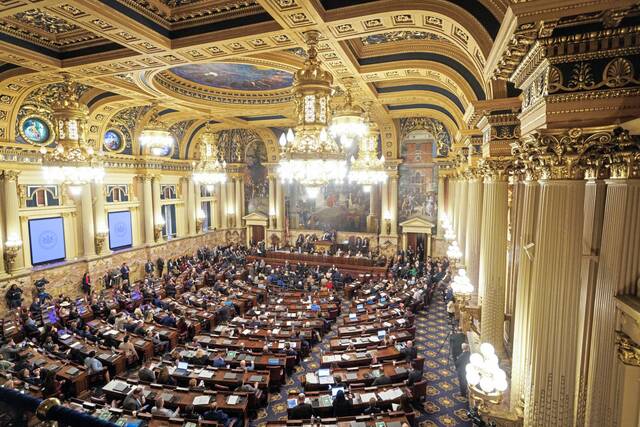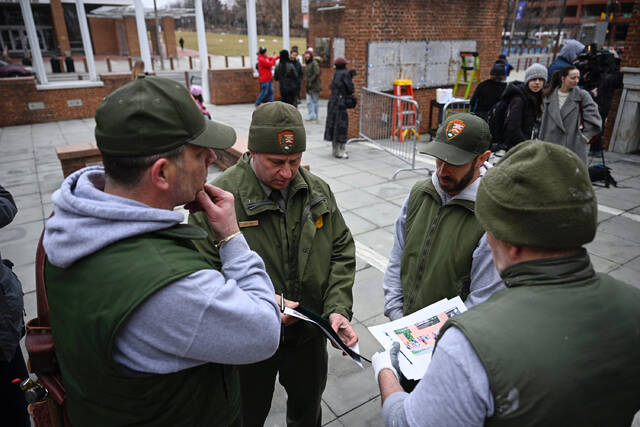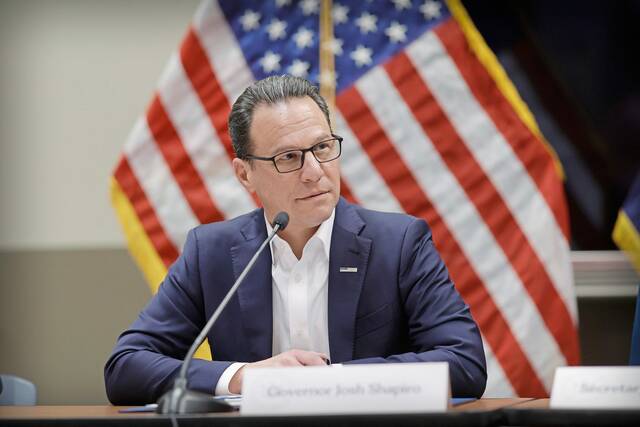Spotlight PA is an independent, nonpartisan, and nonprofit newsroom producing investigative and public-service journalism that holds power to account and drives positive change in Pennsylvania. Sign up for our free newsletters.
HARRISBURG — This year’s state budget didn’t pull slot-like skill games out of their legal limbo in Pennsylvania, despite bipartisan consensus on the need to do so.
But it could still happen. Democratic Gov. Josh Shapiro called the matter “unfinished business,” and legislative leaders have also indicated interest in taking up the issue again next year.
“This building has a long history of going through gaming debates, and they are very complex and very tedious and very difficult,” state Senate Majority Leader Joe Pittman, R-Indiana, said after the budget passed on Nov. 12. “I certainly believe gaming reform is — and must be — an important policy initiative going forward.”
The commonwealth faces a structural deficit, which will require spending cuts or more cash in the state’s coffers. Gambling, alongside other sin taxes, offers a way to raise revenue without making politically unpopular increases to sales or income taxes.
While potentially more palatable to the broader electorate, gambling debates are complex and difficult within the Capitol due to the array of monied interests that defend their existing market share or attempt to expand it further.
But the money at stake is real. Existing taxes on revenue from slot machines and table games, whether in brick-and-mortar casinos or online, as well as levies on activities like sports betting and truck stop-based video gaming terminals, brought in $2.7 billion last fiscal year, a record high.
What was on the table this budget cycle?
Skill games, which have proliferated in bars and gas stations across the commonwealth, exist in a legal gray area and have been subject to years of litigation. They are untaxed and unregulated, and officially setting up laws around them would bring in more gaming cash.
Shapiro proposed in his budget address a 52% tax on the gross revenue of skill games, estimating that it would bring in roughly $400 million. State Senate Republican leaders later backed a plan to tax skill games at a lower rate, 35% of gross revenue.
(Politically powerful casinos pay a 55% tax on electronic games and are pushing for skill games to be taxed at a similar rate.)
As budget talks progressed, neither of the plans went far. Lobbyists for Pace-O-Matic, a major skill games developer and distributor, wanted lawmakers to support legislation introduced by state Sen. Gene Yaw, R-Lycoming County, with a 16% tax.
In the weeks leading up to a final budget deal, Yaw and another state senator, Anthony Williams, D-Philadelphia, proposed levying a $500 monthly fee per machine, rather than a tax. They estimated such a fee would bring in about $300 million.
Yaw, whose district is home to a skill games manufacturer, told Spotlight PA the bill was an attempt to sidestep the impasse between leaders, adding that he thinks the tax rates proposed so far would destroy the existing industry.
Williams noted that the bill also seeks to regulate “stop-and-go” convenience stores with liquor licenses. These stores can serve as illegal gaming hubs, which is a concern among Philadelphia lawmakers.
Both lawmakers said they hope that the legislature will finally address skill games regulations in 2026. If not his bill, Williams added, he hopes the legislature will pass another proposal.
“I think it will be included,” Williams said of skill games. “We got a budget that’s passed, but revenue challenges are coming next year, and we’re not going to raise taxes. So this, along with other items, will be considered.”
Adding complexity to the matter is a case before the state Supreme Court. Justices heard oral arguments about the legality of skill games in late November.
Attorneys for the state argued that the machines’ mechanisms and functionality effectively constitute gambling, violating the commonwealth’s gaming law. “A game that looks like a slot machine, and plays like a slot machine, is a slot machine,” the state attorney general’s office wrote in its brief.
Matthew Haverstick, Pace-O-Matic’s attorney, argued the devices comply with decades of legal precedent and that many of the concerns raised by justices amount to policy questions, like the devices’ profitability.
“Why (do skill machines) make money? Because somebody really brilliant came up with an idea that they tested … It was held to be legal, and nobody appealed,” Haverstick said.
It is not known when the high court will issue a ruling.
‘We get threatened all the time’
Part of what makes gaming such a complex topic is simple: Money.
Gambling is a multibillion-dollar industry in Pennsylvania with several key players. And public officials hold the keys to either helping or hurting their bottom lines.
Pace-O-Matic alone has paid millions of dollars to employ dozens of lobbyists to influence the legislature in recent years. Casinos, legalized in the 2000s, likewise are heavily involved in the legislative process — they employ dozens of lobbyists of their own and also spend millions.
Other smaller players, including those involved in horse racing, sports betting, and truck-stop-only video gaming terminals, add to the complexity of the policy debate.
Then there’s campaign fundraising. A Spotlight PA analysis of campaign finance records found that gaming interests of all stripes gave $1.7 million to top legislative leaders and the governor between Jan. 1, 2023, through Dec. 31, 2024.
Current campaign finance reports show Pace-O-Matic has given money to a PAC that, in turn, donated to a second PAC that has attacked incumbent state Senate Republicans — something that could complicate talks going forward, particularly in the upper chamber.
The company has historically made significant donations to legislative Republicans. But that once-friendly relationship soured earlier this year, after GOP leaders in the state Senate backed legislation that would have taxed the industry at a higher rate than it preferred.
Around the same time, door knockers delivered fliers attacking key GOP lawmakers. State Sens. Frank Farry, R-Bucks County, and Chris Gebhard, R-Lebanon County, were “siding with Harrisburg insiders and lobbyists to stop small town groups like our volunteer firefighters and VFWs from being able to raise additional revenues,” the fliers, viewed by Spotlight PA, said.
In June, Pace-O-Matic accused the state Senate’s top two GOP leaders of intimidating its lobbyists unless they dropped the company as a client. Three firms did. (A GOP spokesperson called the allegation “bizarre.”)
A lobbyist for Pace-O-Matic told Spotlight PA at the time that it did not coordinate with the group that advanced the ad campaign attacking GOP senators.
However, federal campaign finance records show Pace-O-Matic began giving money to Citizens Alliance, a national conservative political group, as budget talks intensified in May — $630,000 total as of Nov. 21.
Soon after Pace-O-Matic’s first donation, Citizens Alliance contributed to an Ohio-based super PAC called Defeating Communism — the group behind the fliers. Citizens Alliance has donated $428,000 to the super PAC this year.
Cliff Maloney, CEO of Citizens Alliance, said the organization’s aim is to make Pennsylvania into a “red wall” by running a program to “compete with Democrats’ door-knocking efforts,” and “run a pledge program to hold both Democrats and Republicans accountable to the principles of the (Pennsylvania) and (U.S.) Constitution.”
“Yes, partners are working to hold Senate Republicans accountable that proposed a new tax on certain small businesses,” Maloney said in the statement.
Department of State disclosures show that in October, Defeating Communism reported $225,000 for door knocking targeting Gebhard as well as state Sen. Camera Bartolotta, R-Washington County. The campaign focused on their votes on past budgets and carbon capture and sequestration, as well as skill games.
Bartolotta told Spotlight PA that she expected taxation of skill games to still be a leading topic in state Senate Republicans’ internal discussions despite the wave of attacks.
The skill games lobby, she said, is “just passing out garbage. And they’re acting like criminals. And I don’t know what in the world they think this is going to do to engender our support.”
Defeating Communism did not respond to a request for comment. Mike Barley, Pace-O-Matic’s chief public affairs officer, said in a statement that the company “donates substantial amounts of funding to politicians and PACs, and we will continue to do so.”
A growing field
The number of moneyed gambling interests who wish to play in the Keystone State is growing.
As Spotlight PA recently reported, the national trade group for sports betting firms launched a more than $500,000 pressure campaign to kill a closed-door budget pitch. The proposal would have raised taxes on sports betting and online casino gaming.
That pressure helped kill the proposal for now, a source told Spotlight PA.
Legal Sports Report, a trade news outlet, reported in November that sports bettors were creating a $10 million super PAC, citing an anonymous source who claimed that Pennsylvania has “rocketed to the top of the list of states where operators are looking to play big during next year’s midterm election.”
While gaming was off the table in 2025, it’s unclear what the future holds.
“We get threatened all the time by some of these interests, you know, ‘We’re going to come beat you up. We’re going to come take you out,’” state Senate President Pro Tempore Kim Ward, R-Hempfield, said at a news conference after the budget’s passage.
“That’s just ridiculous, and it just makes my blood pressure go up. We don’t do well being bullied. And I think a lot of these gaming interests have done nothing but try to bully us. And I don’t think we stand for that.”
EXCLUSIVE INSIGHTS … If you liked this reporting from Stephen Caruso, subscribe to Access Harrisburg, a premium newsletter with his unique insider view on how state government works.








